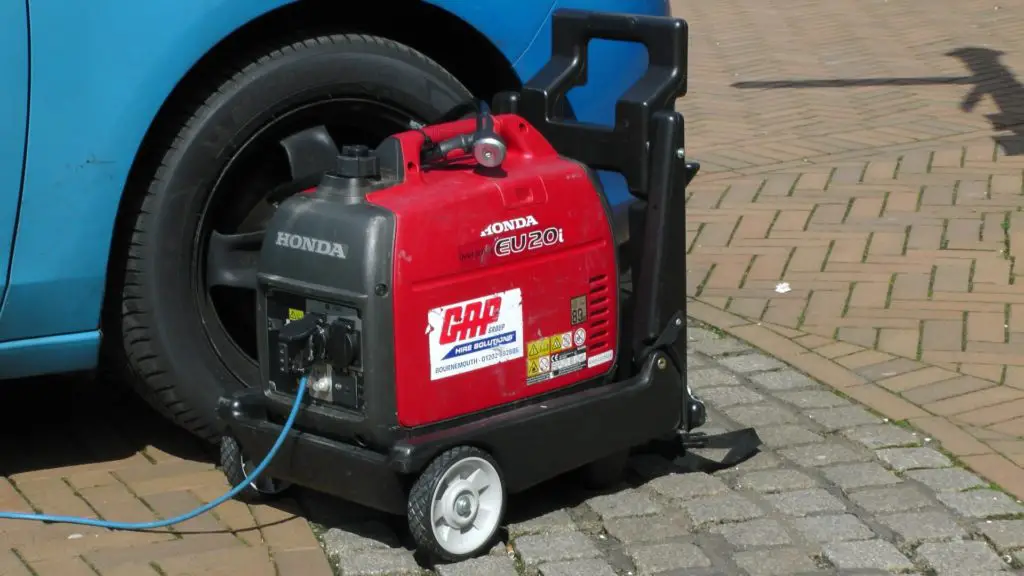Hi-van is supported by its audience. When you purchase using our links, we may earn an affiliate commission (no added cost to you). Learn more
Inverter and generator are two common ways to get power to an RV to run different appliances and devices. However, deciding between these two options can be a daunting task. Both options come with different working mechanisms you need to understand to make an informed decision.
An inverter is connected to the 12V socket of your RV to turn on and power up small appliances and devices. In contrast, a generator uses gasoline, diesel, or propane to turn mechanical energy into electrical energy. It generates more power and can run power-hungry appliances like air conditioners.
In this article, we’ll compare the working mechanism and features of an inverter and generator. Depending on your unique needs, it’ll help you choose the right option for your RV.
Inverter vs. Generator: Comparison Table
| Properties | Inverter | Generator |
|---|---|---|
| Power Source | 12V RV socket | Gasoline, diesel, or propane |
| Ease of Use | Start automatically | Requires time and effort to start a generator |
| Maintenance | Less maintenance required | Period maintenance is Required |
| Capacity | Usually, low capacity | Available in higher capacities |
| Power Output | Suitable for small appliances | Can run power-hungry appliances |
| Noise | Low to no noise | Very loud noise |
What Is an RV Inverter?
Related Guide: What size inverter do I need for my van? How to Use a Power Inverter While Camping This is why your RV inverter beeping

An RV inverter is a device that connects to your RV’s 12V socket and transforms DC (Direct Current) from your vehicle’s battery to AC (Alternating Current).
You can use this device to power up small appliances in your RV, such as laptops, smartphones, tablets, televisions, and microwave ovens.
What’s the Difference Between DC and AC?
In simple words, the current flow in DC is always constant, flowing in a single direction. The current flow in AC changes periodically from negative to positive and vice versa.
DC (Direct Current)
Common household appliances and devices you use in an RV need alternating currents, but the 12V RV socket offers direct current. An inverter takes that DC as input and converts it into AC.
The direct current is a single directional flow of electricity through a wire or any other conducting medium, as shown in the image below.

AC (Alternating Current)
Unlike direct current, the electrical charge flow in alternating current changes its direction periodically. It’s used for powering up common household appliances. It’s represented in the waveform (known as a sine wave), making curved waves showing the cyclic behavior of the electric flow.

What Is an RV Generator?
Related Guide: Camper generator size: How big should you go? Can you sleep in an RV with the generator running?

AN RV generator is a device that transforms mechanical energy produced by the fuel to generate electricity. While some large-scale generators can use coal and even nuclear energy, the ones you use for your RV need gasoline, diesel, or propane.
When it comes to power, a generator performs better than an RV inverter. It can power up large appliances that need more power, such as air conditioners.
Inverter vs. Generator: Feature Comparison
The following are the most important factors you must consider when deciding between an inverter and a generator.

Size
The size of the machine will decide how portable it is, which is an important consideration for RV users.
Inverter
RV inverters are lightweight and have a compact form factor. They’re designed for portability, and you can easily carry and store them in your RV.
Generator
RV generators are designed to power up larger appliances and ensure a consistent and better power supply. They’re basically combustion engines and consist of different components to carry out the fuel-burning process to generate energy. That’s why they’re bigger and heavier than inverters.
Portable generators are also available in the market. They come with handles and wheels so that you can move them easily. But you’ll still need to put in a lot of effort if you need to carry an RV generator.

Power Output
The power output of an inverter or generator determines what appliances and devices they’ll run. A generator uses fuel to generate energy and turn it into electricity, while an inverter needs electricity to work.
So, you’ll need to refill the tank of the generator by going to the gas station.
If the electricity produced by your RV’s solar system is enough to run the appliances you have, you can go with the inverter. It’ll also help you avoid the hassle of refilling the generator’s tank.
However, you’ll need a generator to run heavy appliances like the AC unit as your solar system’s electricity won’t be enough.
Inverter
Inverters come in different sizes, typically ranging from 1000 to 5000 watts. Most people use a 2000- to 4000-watt inverter for RVs. An inverter with a 4000-watt size will power up all your small appliances and devices, including tablets, laptops, smartphones, microwave ovens, and televisions.
Remember that an inverter will not suffice if you need a high-power source to run heavy appliances such as an air conditioner.
Generator
Most people use generators with a 3,000- to 5,000-watt size for 30-amp RVs. But people with 50-amp RVs use larger generators, up to 12,500 watts.
A 5,000-watt generator for 30-amp RV (and a 12,500-watt generator for a 50-amp RV) will be more than enough to power up all your appliances, including the AC unit.

Noise Level
The noise of the power source can make a huge difference, especially if you prefer a quiet operation or there are other people around.

Maintenance
A power source that requires low maintenance will save you a lot of time, effort, and money in the long run.
Inverter
Inverters require little to no maintenance. They have a simple working mechanism consisting of plain circuitry that allows them to convert direct and alternating currents. An inverter is more expensive than a generator but can save you money in the long run.
Generator
As mentioned, generators use gasoline, propane, or diesel fuel to generate electricity, which is why they need regular maintenance. You need to change a generator’s lubricant oil, distilled water and coolant mixture, and engine oil periodically to ensure it continues to work optimally.
While diesel and gasoline engines are extremely reliable and easy to troubleshoot, they get covered in oil residue after some time. So, you also need to clean them regularly to maximize their lifespan.

Inverter vs. Generator: Which One Should You Use for RV?
Whether you need an inverter or generator depends on your unique needs. So, it’s important to determine them to make the most informed decision. If you need to power up small appliances and devices and want something quiet, you can opt for an inverter.
On the other hand, if you need more power to run power-hungry devices, opting for a generator will suit you better.
You can choose both for a win-win scenario if budget is not a problem. It’ll allow you to use the inverter when you only need to run small devices and turn your generator on when it’s time to turn on the AC unit.
Are Inverters or Generators for an RV Necessary?
You should invest in an inverter or generator if you don’t have any other way to run your devices and appliances in an RV. You can use the generator to generate electricity and power up all the appliances and devices you have.
Whereas, you’ll need to pair the inverter with your RV’s solar system to convert DC voltage to alternating current and run appliances.
They’ll allow you to turn on the lights of your RV at night, charge your smartphones, tablets, and laptops, and run other appliances like refrigerators, televisions, and microwaves.
If you don’t have any power source in your RV, you won’t be able to run any of these devices.
What Is an RV Inverter Generator?
An RV inverter generator is a compact, lightweight, and portable device. It uses gasoline, propane, or diesel fuel to convert mechanical energy into DC, just like a regular generator. But it also has an additional unit (inverter) installed that converts the direct current into alternating current.
The benefit of using an RV inverter generator is that you don’t need any external unit to transform DC into AC to run your RV appliances, such as refrigerators, chargers, plugs, and microwave ovens. Additionally, it’s a two-in-one product, which means it’ll serve you as an inverter and a generator.
One of the best features of an RV inverter generator is that you can connect multiple units to create a parallel circuit. This option comes in handy if you need more power in your RV that a single inverter generator can’t produce.
Most RV inverter generators use a single fuel type, but some models can run on two different fuel sources. You can use any of the two fuel types that your RV inverter generator supports.
For example, if your inverter generator can run on propane and gasoline and one of these fuel types isn’t available, you can use the other one to turn your unit on.
Another benefit of using an RV inverter generator is that it makes less noise than a regular generator. So, you can invest in this product if noise is a big concern.
So, Should You Invest in an RV Inverter Generator?
The biggest downside of RV inverter generators is that they’re more expensive than regular generators and inverters. If you’re not on a tight budget, you can invest in this power source to enjoy the best of both worlds.
Not only do they transform DC to AC, but they’re also more energy efficient than traditional generators. Additionally, most modern RV inverter generators have advanced functionality, allowing them to adjust automatically to the power load.
FAQs About Inverter vs. Generator
Is it Safe to Leave a Generator on All Night?
Technically speaking, you can leave your generator on all night. But it is not advisable because of safety reasons. It can put you at risk of being exposed to carbon monoxide poisoning, leading to devastating and irrecoverable consequences.
Can You Keep a Generator on During Rain?
Running an RV generator in snow or rain is not advisable. Your generator must be properly grounded to run safely in such a situation. If it isn’t, you might electrocute yourself, which can be fatal in the worst cases.
How Long Can Fuel Stay in an RV Generator?
If you keep the generator in a cool area and use a fuel stabilizer, the fuel can safely stay in the generator’s tank for up to 12 months. The only risk in keeping the fuel in a generator for a long time is that it can start clogging up the engine’s carburetor.
How Long Can I Run the Inverter on an RV Battery?
You can expect about 6.5 to 9.7 hours of continuous operation from a 100AH battery to power up a 100-watt device. Modern RV inverters come with LCD panels that allow you to monitor the battery power and the amps used by your connected devices. So, you can calculate the expected duration by dividing the battery power by amps.
Final Words
An RV inverter is a modern device that you need to connect to your RV’s 12V socket to convert DC into AC to run small appliances and devices.
At the same time, a generator uses gasoline or diesel fuel to generate electricity. It’s more powerful than an inverter and can run power-hungry appliances, including your RV’s AC unit.
So, if you’re on a budget and need more power, you can go with an RV generator but keep in mind that it’ll cost you more on maintenance. Opting for an inverter is better if you only need to power up small devices and appliances without using gasoline or diesel.
If budget isn’t a problem and you want to enjoy the best of both worlds, you can invest in both options or buy an RV inverter generator.

